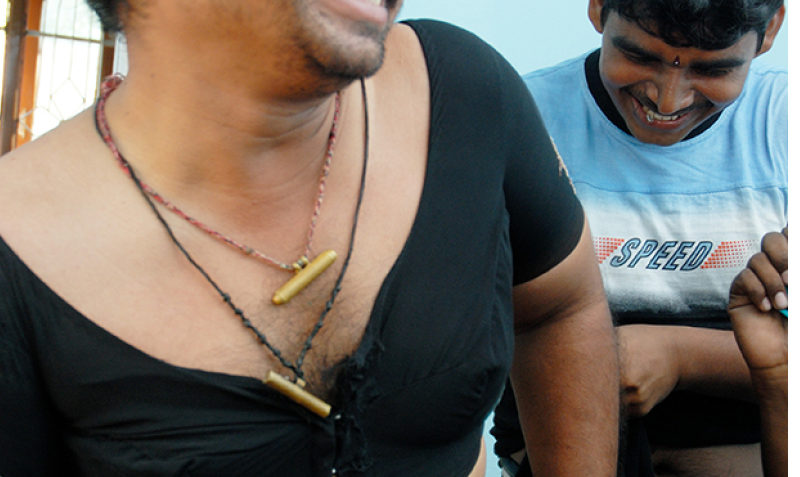“We are free to be who we are”
 © Jenny Matthews for Frontline AIDS
© Jenny Matthews for Frontline AIDS
How the Samarth HIV programme became a support ecosystem for men who have sex with men, hijra and transgender communities in India.
By Rohit Sarkar, senior programme officer for sexuality gender and rights at India HIV/AIDS Alliance, and communications consultant Shreya Ray
The Samarth Noida Clinic, situated down a dusty lane in an industrial suburb of Delhi in India, serves not just as an HIV healthcare centre but as a safe haven for men who have sex with men (MSM), transgender and hijra communities.
We’re visiting the clinic as part of an HIV prevention workshop hosted by India HIV/AIDS Alliance, which brought together advocates and prevention experts from Alliance Linking Organisations to share best practice on community-led HIV programmes that put people at the centre.
Funded by the Elton John AIDS Foundation, Samarth takes a ‘test-treat-adhere-prevent’ approach, in line with UNAIDS’ 90-90-90 targets, by offering services that are person-centred and peer-led. People coming to the clinics are offered early HIV tests and immediate linkages to treatment and are also able to access a variety of sexual and reproductive health and rights services, such treatment for sexually transmitted infections and legal support.
In Delhi, the Samarth clinic was established in Noida partly because it was “anonymous, and far enough from the city to maintain a distance [from the areas where the community members live and may face stigma],” says activist Deepak Kumar, the clinic’s manager.
Deepak adds: “Between 200 and 300 transgender and hijra sex workers come to Noida every night for work, from around 9pm to the morning, so it also made sense that a clinic geared to look after their needs was located in the area. We had to look at over 20 properties simply because no landlord wanted to rent his place to MSM and transgender communities, even though we told them it was going to be a clinic.”
We had to look at over 20 properties simply because no landlord wanted to rent his place to the MSM and transgender communities, even though we told them it was going to be a clinic.
“The current property was found with great difficulty. The first months after opening were littered with incidents of harassment and taunts from neighbours. There were comments on the lines of ‘what immoral activity are you doing here?’, ‘you people are loud and obnoxious’,” says Sneha, a transgender activist who works as a counsellor at the clinic.
Changing attitudes
Partnering with Basera Samajik Sanstan, a community based organisation housed in the same building, Samarth Noida Clinic worked with the police and local health workers to hold a series of awareness-building workshops. This has enabled neighbours and other people in that area to interact with project members and staff and learn about the purpose of the space, and its benefits for wider public health.
Smarth Noida is now open 365 days a year. Typically, it gets around five clients a day, a number that can rise to 15 on Sundays, its busiest day. Successes like these have led to the Samarth programme being recognised by India’s National AIDS Control Organization for its ability to connect with the most at-risk sections of MSM, hijra and transgender communities, who had not previously been reached by public HIV prevention services. As a result, Samarth representatives have been invited to develop national community-based testing guidelines.
Understanding issues, building trust
A big part of the Samarth programme is about building relationships. As local MSM and transgender communities mainly socialise through social media, staff will use Facebook, Whatsapp and Grinder to reach out to them. Staff will also visit people in their homes or communities in order to get to know their concerns and issues. “We usually go and start talking about general health like diabetes and sugar levels, and only then move on to HIV,” says Sneha.
We usually go and start talking about general health like diabetes and sugar levels, and only then move on to HIV.
“We then go over, and give information about the latest drug PrEP [pre exposure prophylaxis] that can prevent HIV. Although common in other countries, this is still new in India,” explains Akshita, an officer at Samarth.
A place to belong
But what makes Samarth more than a medical programme is the sense of community and belonging it provides to MSM, transgender and hijra groups. On the floor above the clinic, Basera Samajik Sanstan implement the ‘Wajood’ (‘identity’) programme, a project initiated by Alliance India with funding from Amplify Change.
Here, people are at liberty to be themselves and most don colourful sarees, make-up and jewellery. Wajood has a subsidised beauty parlour attached to it, and distributes pamphlets for affordable laser hair-removal. There is also a condom box, and another for suggestions.
The staff at Samarth view client confidentially as absolutely crucial; if somebody turns out to be HIV positive, only the client and their counsellor or nurse will learn of this information. The trust MSM, transgender and hijra communities have in the project staff plays a big part in helping them feel comfortable in visiting and returning to Samarth, a trust they do not enjoy in wider society.
“Many of us are afraid to roam around like this in the outside world – we are in plain men’s clothes there. People stare too much and it hurts”, says Akshita. “But inside here, it is home, we are free to be who we are.”
For more information about the Alliance’s work in India visit www.allianceindia.org.
This article was written as the International HIV/AIDS Alliance, before we changed our name to Frontline AIDS.
Tags
Alliance IndiaElton John AIDS FoundationGenderHIV preventionIndiaLGBT


